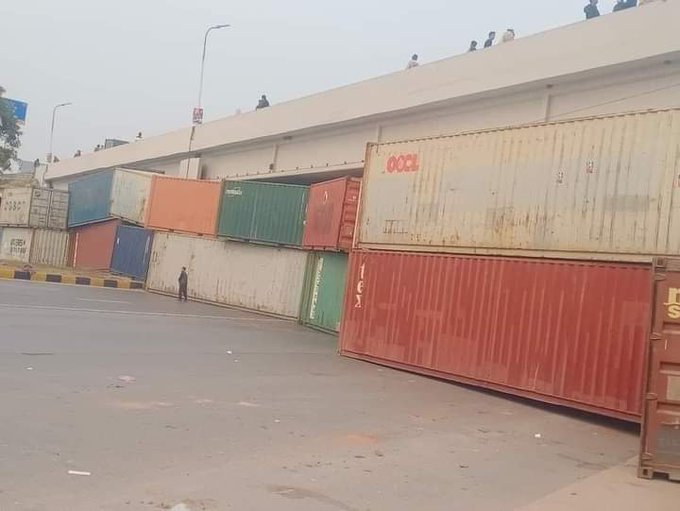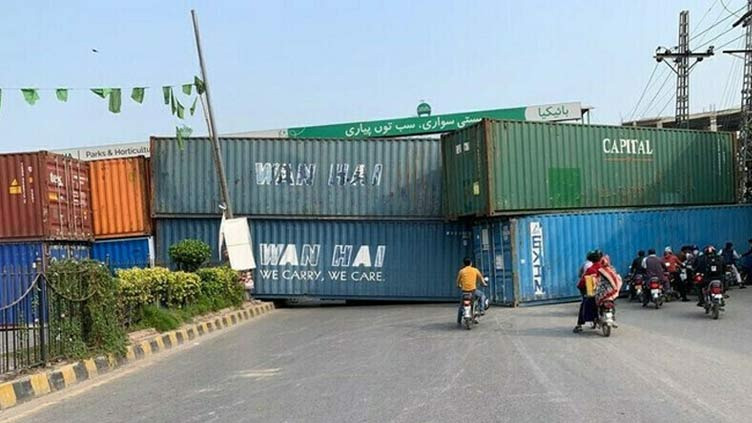Islamabad, the capital of Pakistan, has recently witnessed unprecedented scenes of protest, confrontation, and lockdowns as supporters of former Prime Minister Imran Khan have taken to the streets.
The city remains sealed off with shipping containers, major roads blocked, and police forces on high alert as thousands of demonstrators rally to demand Khan’s release from prison.
The political tension underscores deep-seated divisions within the country and raises significant questions about democracy, governance, and the future of Pakistan’s political landscape.
Road Blocks with Containers in Islamabad
Imran Khan, once hailed as a symbol of hope and reform, has been imprisoned for over a year, facing more than 150 criminal charges ranging from corruption to inciting violence. His supporters, however, argue that these charges are politically motivated, designed to eliminate him from the political arena.
Khan’s party, Pakistan Tehreek-e-Insaf (PTI), continues to maintain that the cases lack merit and are part of a larger effort by the current coalition government, led by Prime Minister Shehbaz Sharif, to suppress dissent and maintain control.
The recent wave of protests was sparked by Khan’s call to his followers to rally until the government agreed to release jailed party leaders and roll back laws that allegedly interfere with judicial independence.
Despite facing a ban on public gatherings and widespread arrests, PTI supporters have defied the restrictions, staging demonstrations across Pakistan and even in cities abroad like London and Paris. This defiance highlights the enduring influence and popularity of Khan, even from behind bars.
Read : Pakistani Fan Asked to Leave Stadium for Showing Imran Khan’s Poster: Watch
Authorities responded by sealing off Islamabad with shipping containers, creating roadblocks on major highways and entry points. This strategy, while intended to prevent violence and maintain order, has also intensified the sense of siege and frustration among citizens.
Container City….. Islamabad Current Placement of Containerx#DChowkProtest#فائنل_کال_24_نومبر#احتجاج_سے_انقلاب_تکpic.twitter.com/qw54tk7Ecy
— Talha Mudassir Bhatti (@Talhamudassir) November 23, 2024
The government’s decision to suspend cellular services in some areas further exacerbated tensions, as it disrupted communication and added to the feeling of isolation.
The Impact on Islamabad and Beyond
The blockade of Islamabad has had far-reaching effects on daily life, the economy, and the political atmosphere in Pakistan. Major roads and highways connecting the capital with PTI strongholds in Punjab and Khyber Pakhtunkhwa have been shut down, disrupting transportation and commerce.
The use of shipping containers to create physical barriers is a tactic that has been employed in the past, but the scale and duration of the current lockdown are unprecedented.
For residents of Islamabad, the roadblocks have created significant hardships. Commuters face long delays, businesses have suffered losses, and the overall atmosphere in the city is one of tension and uncertainty. The lockdown has also impacted the delivery of essential services, with reports of ambulances and emergency vehicles struggling to navigate the blocked roads.
The situation has also had a psychological impact. The sight of shipping containers and heavy police presence has created a sense of fear and apprehension among citizens. Many feel caught in the crossfire between the government and the opposition, unsure of what the future holds.

The lockdown has also raised concerns about the state of democracy in Pakistan. Critics argue that the government’s heavy-handed response to the protests is indicative of a broader trend towards authoritarianism and suppression of dissent.
The protests and the subsequent crackdown have also had international implications. Pakistan’s political instability has drawn attention from global leaders and organizations, raising questions about the country’s commitment to democratic principles and human rights.
The international community is watching closely, particularly given Pakistan’s strategic importance in the region and its ongoing economic challenges.
The Broader Political and Economic Context
The protests and roadblocks in Islamabad are not occurring in a vacuum; they are part of a larger political and economic crisis that has been unfolding in Pakistan for some time.
Prime Minister Shehbaz Sharif’s government, which took power after national elections in February, faces significant challenges, including a weak economy and the need for difficult reforms under the International Monetary Fund (IMF) bailout program.
All entry and exit points to Islamabad have been blocked with containers.
— Hariss Zack 𝕏 (@TopG3i) November 23, 2024
#نومبر24_یوم_انقلاب pic.twitter.com/K34tgBMdn6
One of the key issues is the government’s attempt to impose taxes on the agriculture and retail sectors, which have traditionally resisted such measures. These reforms are necessary to stabilize the economy and meet the conditions of the IMF loan, but they have also fueled discontent and unrest.
Many Pakistanis feel that the burden of these reforms falls disproportionately on the poor and middle class, while the wealthy and powerful remain largely unaffected.
The political crisis has also exacerbated the economic challenges. The ongoing protests and instability have deterred foreign investment and created uncertainty in the markets.
Businesses are hesitant to invest or expand, and the overall economic outlook remains bleak. The government’s focus on maintaining control and suppressing dissent has also diverted attention and resources away from addressing the country’s economic problems.
Imran Khan’s supporters argue that his imprisonment and the charges against him are part of an effort to distract from these economic issues. They believe that Khan’s policies and leadership are the key to solving Pakistan’s problems and that his removal from the political scene is a deliberate attempt to undermine the opposition and maintain the status quo.

The protests in Islamabad are the largest and most significant since Sharif’s coalition government took power. They represent not just a demand for Khan’s release but a broader call for political reform and accountability.
The PTI’s ability to mobilize thousands of supporters, despite the risks and challenges, is a testament to the enduring appeal of Khan’s message and the deep dissatisfaction with the current government.
The roadblocks with shipping containers in Islamabad symbolize more than just a physical barrier; they represent the deep divisions and challenges facing Pakistan today. The protests by Imran Khan’s supporters highlight the ongoing struggle for democracy, justice, and economic stability in the country.
While the government’s response has been focused on maintaining order and preventing violence, it has also raised significant questions about the state of democracy and human rights in Pakistan.
As the situation continues to unfold, it is clear that the roadblocks are not just on the streets of Islamabad but in the political and economic future of the country.
The resolution of this crisis will require dialogue, compromise, and a commitment to democratic principles. For now, the shipping containers stand as a stark reminder of the challenges and choices facing Pakistan in this critical moment.

